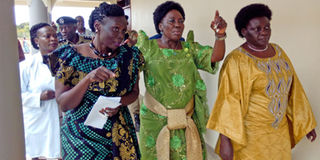Govt pledges support to Soroti fistula hospital

Commissioned. Speaker of Parliament Rebecca Kadaga (centre) with the State Minister for Health, Ms Sarah Opendi (right), and other leaders tour the specialised fistula hospital in Soroti District during its launch last Friday. PHOTO BY SIMON PETER EMWAMU
What you need to know:
- Ms Alice Emasu Seruyange, the executive director of Terrewode, said establishing the facility involved continuous exchange of ideas and a search for resources locally and internationally. The construction started in March last year and was completed in April this year.
- Ms Emasu lauded the International Fistula Alliance that donated funds towards the construction, and the district local government for accepting the project.
- “It was a sacrifice worth taking for the sake of our daughters, mothers, women and girls affected by fistula,” Ms Emasu said
The Speaker of Parliament, Ms Rebecca Kadaga, has pledged government support towards the newly constructed specialised fistula hospital in Soroti District.
While commissioning the Shs4.7b health facility on Friday, Ms Kadaga told the Association for Rehabilitation of Women for Development (Terrewode), the NGO which spearheaded the construction in Arapai Sub-county, that government would meet its recurrent expenditures.
“I want to direct [Parliamentary] commissioner Peter Ogwang to make a vote for this hospital ... Terrewode, you can count on me for some of the recurrent expenditures,” she said.
The Speaker also lauded the NGO for its efforts in fighting fistula.
“In March last year, we gathered here to lay the foundation stone for what we are now seeing. This place was empty. I had a privilege of being the guest of honour on that day,” Ms Kadaga said.
“My presence here shows the level of commitment government has over the health of citizens, to Terrewode, this achievement is commendable,” she added.
Ms Kadaga said the hospital would provide wholistic treatment to women and girls suffering from obstetric fistula.
“I learnt that this specialised hospital, besides providing treatment, will also be rendering reintegration services to survivors of fistula in accordance with our national fistula policy, so this will be a place of both physical and psychological healing. This is a step in the right direction in preserving the dignity of our patients,” the Speaker said.
Ms Alice Emasu Seruyange, the executive director of Terrewode, said establishing the facility involved continuous exchange of ideas and a search for resources locally and internationally. The construction started in March last year and was completed in April this year.
Ms Emasu lauded the International Fistula Alliance that donated funds towards the construction, and the district local government for accepting the project.
“It was a sacrifice worth taking for the sake of our daughters, mothers, women and girls affected by fistula,” Ms Emasu said.
Target
“We hope to treat and reintegrate 600 women and girls suffering from fistula at this hospital annually. We already started these processes and some of those women are here with us today,” she added.
Ms Sarah Opendi, the State minister for Health, said while the World Health Organisation estimates that two million women and girls live with untreated fistula in Asia and sub-Saharan Africa, Uganda has about 75,000 to 100,000 women and girls with obstetric fistula.
Ms Opendi said each year, between 50,000 and 100,000 women and girls get fistula worldwide, according to the WHO, of these, about 2,000 new cases occur in Uganda.
She said the country has 25 specialised fistula doctors who handle 1,900 cases of fistula annually.
What is fistula?
Fistula, according to the National Association for Continence website, is “an abnormal connection or passageway that connects two organs or vessels that do not usually connect”. The site adds that they can develop anywhere between an intestine and the skin, between the vagina and the rectum, and other places.
Dr Paul Hilton, a surgeon at Kitovu Hospital in Masaka, says the most common type that affects women in Uganda is obstetric fistula, which is usually caused by neglected or obstructed labour.
“If the obstruction is constant and perhaps prolonged, fistula develops between either the rectum and the vagina, or between the bladder and vagina,” Dr Hilton says. While there are several avenues that can be used to curb fistula, victims continue to face stigma from society.




